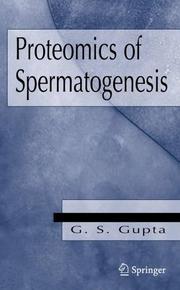| Listing 1 - 2 of 2 |
Sort by
|

ISBN: 1281087238 9786611087234 0387276556 038725398X Year: 2005 Publisher: New York, NY : Springer US : Imprint: Springer,
Abstract | Keywords | Export | Availability | Bookmark
 Loading...
Loading...Choose an application
- Reference Manager
- EndNote
- RefWorks (Direct export to RefWorks)
Recent developments of experimental techniques in cellular and molecular biology have made it possible to understand the molecular biology of male gametogenesis in greater detail. This book focuses on the description of specialized proteins, which are dominantly and/or specifically expressed in germ cells and localized in spermatozoa. There is an urgent need to classify proteins of spermatogenic cells with a view of their functions, and their applications in the regulation of fertility and in understanding infertility. The understanding of structural properties of male germ cell specific proteins can offer vulnerable points for targeted intervention in testis without generalized effects on stages of spermatogenesis. Besides targeted action in male germ cells, sperm specific proteins and polypeptides may also offer potential application in the development of a contraceptive vaccine. Researchers in the fields of biochemistry, cell biology, molecular biology, reproductive biology and proteomics will find this book of interest. "This book is far superior to any previous book on the subject. I recommend this book with great enthusiasm." Pawan K. Singal St. Boniface General Hospital Research Center .
Spermatogenesis. --- Proteomics. --- Molecular biology --- Proteins --- Formation of spermatozoa --- Spermatozoa --- Gametogenesis --- Formation --- Cytology. --- Cell Biology. --- Cell biology --- Cellular biology --- Biology --- Cells --- Cytologists --- Cell biology. --- Proteins. --- Protein Biochemistry. --- Proteids --- Biomolecules --- Polypeptides --- Proteomics

ISBN: 1280346833 9786610346837 3540294465 3540257500 Year: 2005 Publisher: Berlin, Heidelberg : Springer Berlin Heidelberg : Imprint: Springer,
Abstract | Keywords | Export | Availability | Bookmark
 Loading...
Loading...Choose an application
- Reference Manager
- EndNote
- RefWorks (Direct export to RefWorks)
Unwanted childlessness affects approximately one in six couples worldwide. - though the exact proportion of the predominant cause of the problem remains controversial, according to the World Health Organization (WHO), in nearly 40% of cases the cause can be attributed to the female, in 20% to the male, in 25% to both, and in 15% the cause remains unknown. Based on these ?gures, the - cidence of male factor infertility in the general population is approximately 7%. The majority of these men, approximately 30%, experience irreversible idiopathic infertility and cannot father children without some form of medical intervention. Male factor infertility, in addition, may be caused by testicular germ cell cancer, which is known to represent the most common cancer among young men, aged 15 to 35 years, in Western industrialized countries. The number of affected men has increased dramatically over the past 50 years. There is now growing evidence that human testicular germ cell cancer originates from fetal germ cells exhibiting an aberrant programme of gene expression, and tumour progression may be favoured by an aberrant Sertoli cell-germ cell communication.
Sertoli cells. --- Germ cells. --- Spermatogenesis. --- Infertility, Male. --- Male infertility --- Male sterility --- Sterility, Male --- Generative organs, Male --- Infertility --- Formation of spermatozoa --- Spermatozoa --- Gametogenesis --- Gametocytes --- Germ-line cells --- Germline --- Reproductive cells --- Sex cells --- Cells --- Germplasm resources --- Cells of Sertoli --- Sertoli's cells --- Sustentacular cells --- Testis --- Diseases --- Formation --- Medicine. --- Biomedicine general. --- Clinical sciences --- Medical profession --- Human biology --- Life sciences --- Medical sciences --- Pathology --- Physicians --- Health Workforce --- Biomedicine, general. --- Medicine --- Biology --- Biomedical Research. --- Research. --- Biological research --- Biomedical research
| Listing 1 - 2 of 2 |
Sort by
|

 Search
Search Feedback
Feedback About
About Help
Help News
News